Preventive care isn’t one-size-fits-all when it comes to good oral health. Every patient is different, and that’s why we focus on creating customized dental care plans based on their specific risk levels here at Making You Smile Cosmetic Dental Studio in NYC. This personalized approach is how we turn things around for our dental patients who are at high risk for cavities and other dental issues.
We don’t just treat patients at our New York City dental office; we evaluate their teeth and gums based on their history and current dental health. Some patients have never had cavities, while others come in with multiple issues. We divide our patients into three categories: low risk, moderate risk, and high risk. For those in the high-risk category, we prescribe specific mouthwash to reduce bacteria and toothpaste to remineralize weakened tooth surfaces. It’s all about addressing the root cause of the problem, not just patching it up.
For our patients that are at a high-risk for cavities and gum disease, we do more than just the usual cleanings. We ask them to come in for additional cleanings throughout the year, and we apply fluoride varnish to strengthen their teeth. It’s not just about treatment — it’s also about motivation and support. These extra visits help us closely monitor their progress and ensure that they’re on the right track when it comes to their oral health.
The goal of our dental clinic is to move high-risk patients down to moderate risk over time. And we’ve seen great success with this approach. Patients who used to have cavities at every visit now come in without any new dental issues. It’s all about creating a system that works for them and turns their dental health around. If you are looking to schedule a routine cleaning or an examination of your teeth we invite you to contact our New York dental clinic today. 646-484-0197
People often don’t realize how much their eating habits affect their teeth. It’s not just about sugary snacks — even “healthy” choices can be problematic if consumed the wrong way. As we often tell our patients here at Making You Smile Cosmetic Dental Studio, it’s not just what you eat, but how long your teeth are exposed to it. The number one thing you can do to help protect your teeth when it comes to eating is to eat quickly. This will reduce the amount of time your teeth are coming into contact with bacteria forming foods.
One of the biggest misconceptions is that it’s okay to snack throughout the day as long as you’re eating healthy foods. But the truth is, the longer your teeth are exposed to food — any food — the more harm you’re doing. Even something like an apple can cause problems if you eat it slowly over an hour, rather than in a few minutes. And if you’re sipping on coffee with sugar or even honey all day? You’re just decalcifying your teeth, creating the perfect environment for cavities to form.
The key is to limit how long your teeth are exposed to food. We always tell our patients to snack quickly, and make sure they finish their meal or snack within 15 to 30 minutes. Your mouth’s pH level stays acidic for about 30 minutes after you eat, so if you’re constantly snacking, your teeth are exposed to acid for hours. Although, it is better to choose snacks that are less harmful such as almonds, jello, or even a quick protein bar, it is still important to make sure you’re not eating slowly over long periods.
It’s not about cutting out all your favorite foods — it’s about being smart about how you consume them. By adjusting how often and how long your teeth are exposed to food, you can make a big difference in your dental health. Small changes like these can prevent major issues down the road. When it comes to dental care, the best thing you can do is book routine cleanings and dental exams with your family dentist. And for more tips on nutrition and your teeth see our article on Nutrition and Diet for Preventing Cavities
 Antibiotic prophylaxis sometimes referred to as premedication is when you are prescribed a round of antibiotics before you get a dental procedure done such as a dental cleaning, filling, or tooth removal. The purpose of dental premedication is to prevent an infection from occurring post-procedure, especially for patients who may have heart issues or who have a prosthetic joint.
Antibiotic prophylaxis sometimes referred to as premedication is when you are prescribed a round of antibiotics before you get a dental procedure done such as a dental cleaning, filling, or tooth removal. The purpose of dental premedication is to prevent an infection from occurring post-procedure, especially for patients who may have heart issues or who have a prosthetic joint.
There are professional guidelines developed between the American Dental Association and the respective medical specialties (for example American Heart Association) based on studies that evaluated the benefits and risks of dental antibiotic prophylaxis in each medical condition. These guidelines are updated and revised periodically every few years as new studies provide more accurate data.
Joint replacement: in general, it is not recommended to have antibiotic prophylaxis for most patients with prosthetic joint replacement prior to dental procedures to prevent prosthetic joint infection. Some exceptions may apply to patients with a history of complications associated with their joint replacement.
Heart conditions: antibiotics are not recommended for valve prolapse (the most common condition for which antibiotics prophylaxis was prescribed in the past), stents, and many other minor shunts, filters, and pledgets. It is recommended for certain congenital defects, valve replacement, and congestive heart failure. A review of your medical condition against the guidelines of recommendation is necessary to make a recommendation for antibiotic prophylaxis.
Note: Antibiotics are prescribed only when needed; when their benefits outweigh their potential harm such as bacterial resistance, allergic reaction, and opportunistic infections.
When a local dentist near you decides that a treatment of antibiotic prophylaxis would be best there are a few common medications that they will typically prescribe.
It is always best to speak with your family dentist if you have any concerns about taking medications prior to a dental procedure appointment.
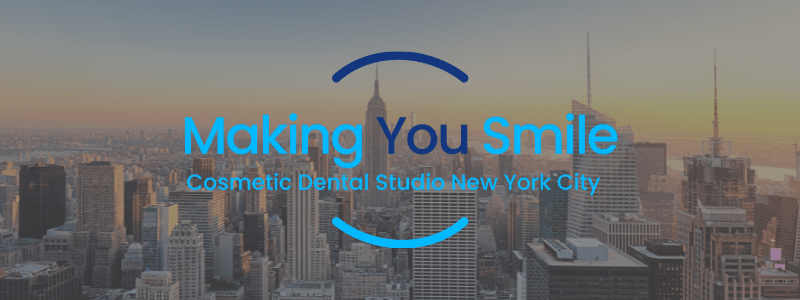
If you live in New York City and are concerned about a needed dental procedure and whether it would be wise to conduct antibiotic prophylaxis ahead of time contact Making You Smile Cosmetic Dental Studio. We would be happy to schedule an initial consultation and cleaning to determine the best course of action to keep your mouth and body as healthy as possible. 646-484-0197
"I had a lot of work done with Dr. Ziad J. Cosmetic dentistry to be specific. Many appointments to have bridge work done as well as two crowns placed on my front two teeth. I was very happy with Dr. Ziad’s work and attention to detail. He’s an excellent cosmetic dentist. And I’ve been to a lot of them. After finishing all of the work done on me I was happy and pleased with his services and staff. If you want to get cosmetic work done, he is the man to talk to without a doubt. Total perfectionist."
Nick K.
Rating 5/5 ⭐⭐⭐⭐⭐
See our 4.9 rating and read more of our 291+ reviews on Google.
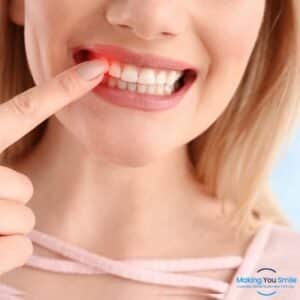 Jump To: What Are The Symptoms of Gum Disease?, How To Prevent Gum Disease, See A Trusted Dentist Near You About Gum Disease Today
Jump To: What Are The Symptoms of Gum Disease?, How To Prevent Gum Disease, See A Trusted Dentist Near You About Gum Disease Today
Everyone wants a great healthy smile but there are a number of ways that people can end up with oral health problems. One of the biggest dental problems we see in our New York dental clinic is gum disease.
There are actually two kinds of gum disease, gingivitis & periodontitis. Gingivitis is the early stage of gum disease which is reversible with proper treatment. Periodontitis is a more serious stage of gum disease because it destroys gum tissue and bone and typically requires the help of an experienced dentist near you to deal with properly.
For both gingivitis and periodontitis the symptoms are more or less very common. Any of the following symptoms could signify that you are dealing with gum disease. If you are experiencing any of the following it is best to book an appointment with a qualified dentist near you.
In severe cases gum disease can cause the destruction of gum tissue and or bone loss. Both of these can result in loss of teeth since the anchor tissue that holds your tooth in your mouth is slowly wearing away.
Treatment for gingivitis includes going to your local dentist office for frequent dental teeth cleanings as well as using an antibacterial mouthwash given by them for temporary use. Good home care that involves flossing first, brushing 2x a day and rinsing afterwards will also go a long way to help treat gingivitis.
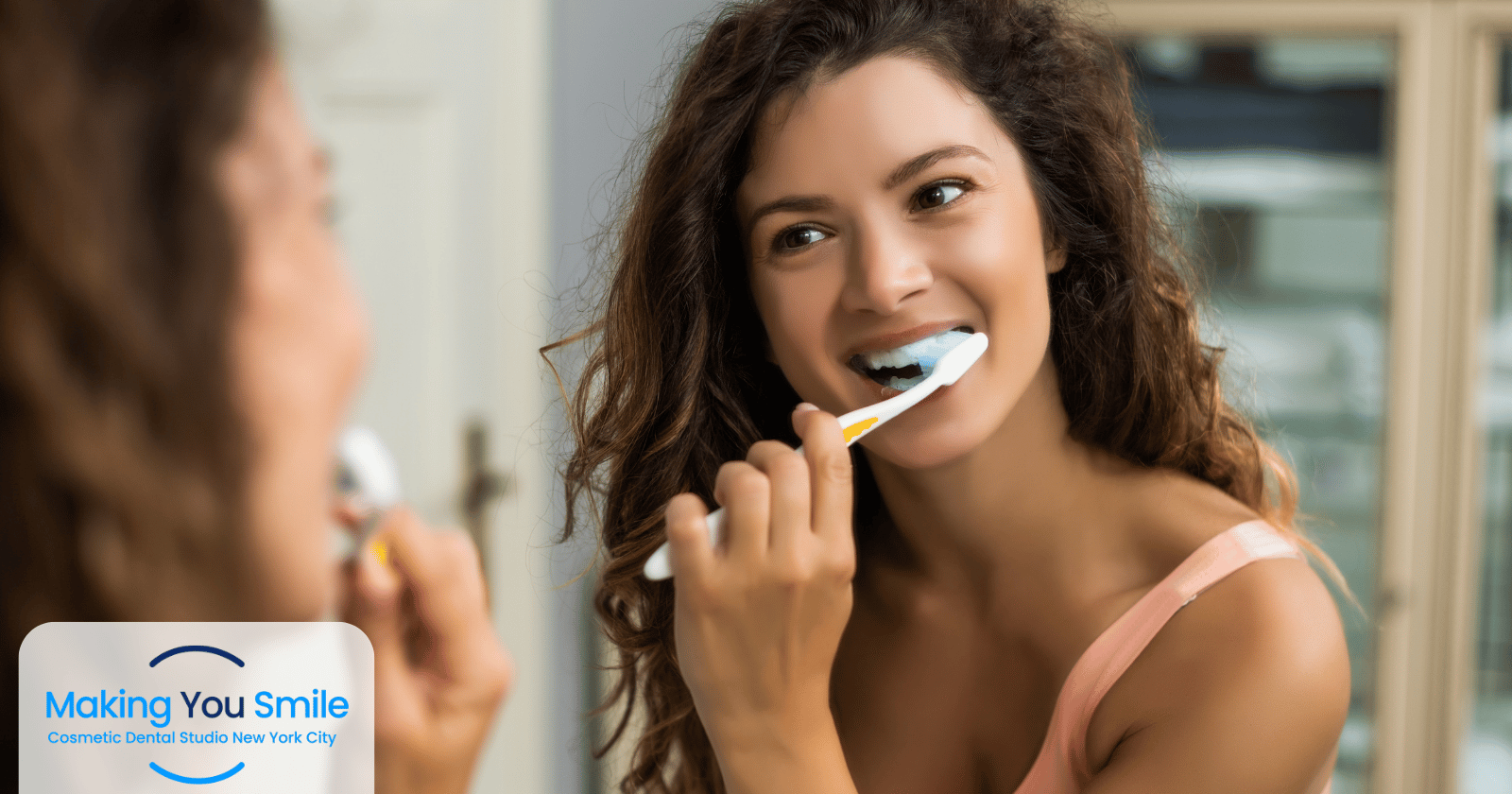
Treatment for periodontitis (bone loss and pocketing) includes deep cleaning under the gums in two appointments at your family dentist office. The dentist will numb the areas that need to be cleaned to thoroughly remove plaque and calculus from under the gums and pockets. More frequent dental cleanings following the deep cleaning procedure will be necessary, every 3–4-months, to maintain the health. In severe cases additional dental procedures may be needed to reduce pockets and infected gum tissue to give better access to your toothbrush and help you maintain good oral hygiene.
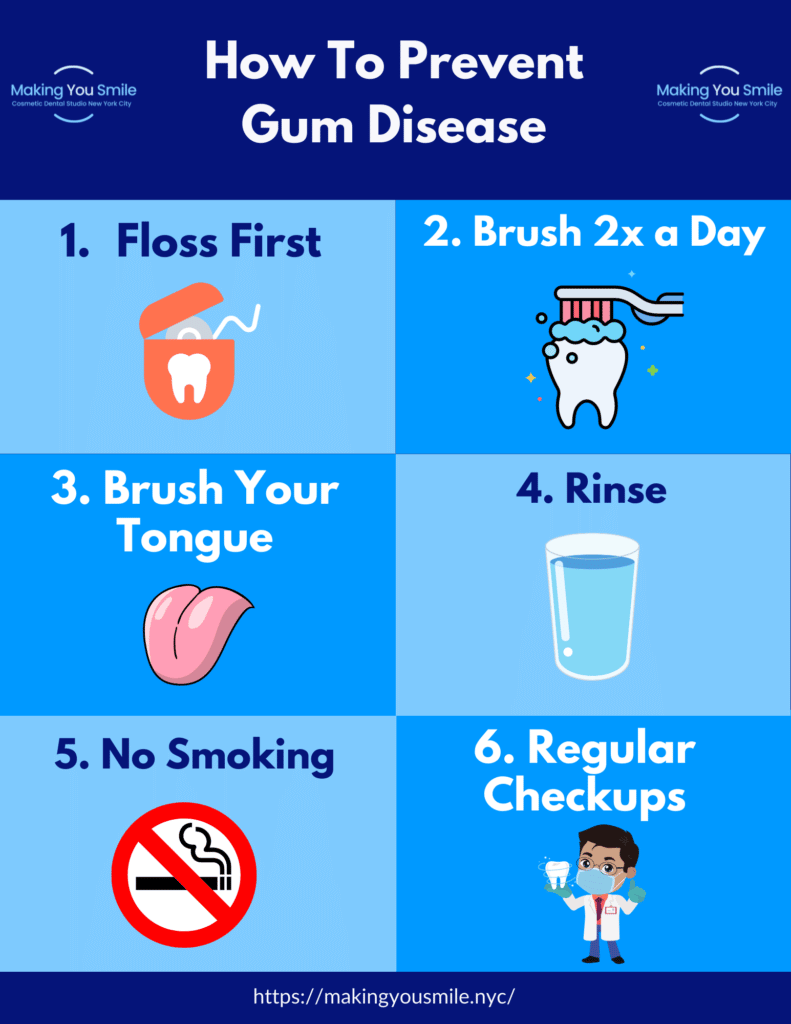 Prevention is key when it comes to dealing with gum disease, making sure to take care of your mouth before gingivitis can turn to periodontitis. There are some very easy steps you can take in your daily routine to keep your mouth and gums healthy and disease free.
Prevention is key when it comes to dealing with gum disease, making sure to take care of your mouth before gingivitis can turn to periodontitis. There are some very easy steps you can take in your daily routine to keep your mouth and gums healthy and disease free.
It is also important to schedule routine cleanings with your family dentist so that they can keep an eye on your oral health and take care of small issues before they become big ones.
Comparing A Healthy Mouth To A Mouth Suffering From Periodontitis
If you aren’t sure if you are dealing with gum disease or not it can be helpful to see examples of gum disease and what to watch out for. Below is a comparison of a healthy mouth to that of a mouth where the person is currently dealing with periodontitis.

If you live in New York City and are concerned about your gums and possible gum disease issues contact Making You Smile Cosmetic Dental Studio. We would be happy to schedule an initial consultation and cleaning to determine the best course of action to keep your teeth looking their best. 646-484-0197

See What Our Patients Have To Say About Us:
"I had a lot of work done with Dr. Ziad J. Cosmetic dentistry to be specific. Many appointments to have bridge work done as well as two crowns placed on my front two teeth. I was very happy with Dr. Ziad’s work and attention to detail. He’s an excellent cosmetic dentist. And I’ve been to a lot of them. After finishing all of the work done on me I was happy and pleased with his services and staff. If you want to get cosmetic work done, he is the man to talk to without a doubt. Total perfectionist."
Nick K.
Rating 5/5 ⭐⭐⭐⭐⭐
See our 4.9 rating and read more of our 291+ reviews on Google.
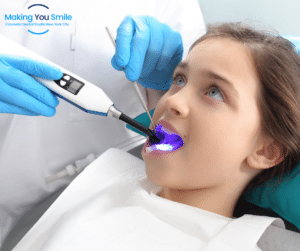 Dental sealants are a fantastic way to protect your teeth and help you keep a healthy white smile for years to come. At Making You Smile we are proud to offer dental sealants to residents of NYC and throughout New York state. If you are looking to get dental sealants for yourself or your family don’t hesitate to contact our office to set up an appointment.
Dental sealants are a fantastic way to protect your teeth and help you keep a healthy white smile for years to come. At Making You Smile we are proud to offer dental sealants to residents of NYC and throughout New York state. If you are looking to get dental sealants for yourself or your family don’t hesitate to contact our office to set up an appointment.
A dental sealant is a thin protective coating, made of a white filling material, that is brushed onto the chewing surfaces of back teeth (molars & pre-molars). The liquid material is applied to the teeth and then using a curing light to harden the material the sealant is set. Once the dental sealant material has hardened to the teeth it will prevent food and or bacteria from sitting in the grooves of the back teeth and causing cavities.
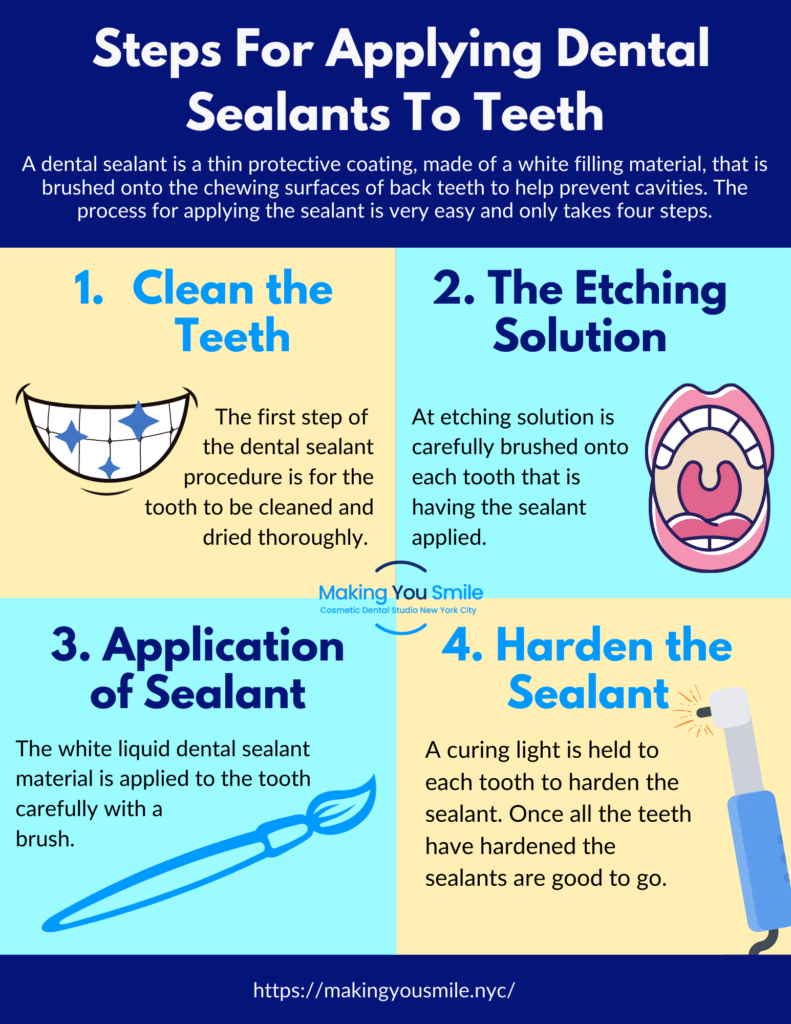 Who is a Good Candidate for Dental Sealants?
Who is a Good Candidate for Dental Sealants?The molars of children and adolescents are the primary candidate for dental sealants. Adults can have a dental sealant applied in particularly deep fissured molars and premolars, but it is highly recommended to place sealants as soon as the first molars erupt around the age of six.
Dental sealants are recommended for adult permanent molars and premolars.
By having a dental sealant applied to your tooth it reduces the risk of cavities by not allowing food and or cavity-causing bacteria to adhere to the molars or premolars. Because these types of teeth have deep grooves and or pits in them they can be more susceptible to getting cavities.
Some people hesitate at having dental sealants applied to their teeth because they believe them to be harmful. There is a minute amount of BPA in some dental sealants but not enough to cause any harm. Here at your number one choice of dentists in New York City, Making You Smile, we use a BPA-free sealant ClinproTM.
The only other potential harm in using dental sealants is that the patient could have an allergy to the sealant, but that is extremely rare. Overall, dental sealants are very safe to use and the benefits outweigh the downside.
When it comes to your children and their oral health you want to do all you can to help prevent cavities or other dental issues down the road. We all know that children, try as they might, don’t always do the best job of brushing their teeth. That is why we, as does the CDC, recommends dental sealants for children ages 6-11, since children who do not get dental sealants are 3x more likely to end up with cavities.
Not only can dental sealants be helpful for children’s teeth, we also recommend applying them to baby teeth as well. Although baby teeth do fall out eventually if a baby tooth does get a cavity, if it is severe enough it will need to be filled, which can be a hard experience for a child.

If you are looking to have dental sealants applied to your teeth or the teeth of your children don’t hesitate to reach out to our New York City dental clinic. We would be happy to answer any questions you have or book your consultation about getting dental sealants. Contact our office today!
Teeth are incredibly strong and can withstand great force or pressure being placed upon them, but even they can have their breaking point. Biting down on something the wrong way, suffering some sort of facial trauma like a sports injury, or even excessive grinding of your teeth can all lead to tooth fractures and the need to visit a local dentist near you to treat them. But what is a tooth fracture and can a tooth that’s been fractured be saved?
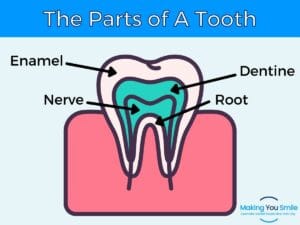 Tooth Fractures Can Occur at Different Levels
Tooth Fractures Can Occur at Different LevelsTo understand what a tooth fracture is, we need to review tooth anatomy: the tooth is made up of two main parts: a crown (the visible part of your tooth) and the root (the part of your tooth under the gum anchoring your tooth to your jawbone.
The crown is then made up of three separate layers:
A tooth fracture can happen to any of these layers but the deeper the fracture the more serious it is and the more work will be necessary to try to save the tooth.
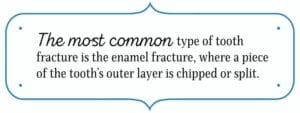 The most common type of tooth fracture is the enamel fracture, where a piece of the tooth’s outer layer is chipped or split. Fractured enamel does not hurt, and you are really only aware that your tooth has been chipped because you see it, or you can feel it with your tongue, lips or cheek.
The most common type of tooth fracture is the enamel fracture, where a piece of the tooth’s outer layer is chipped or split. Fractured enamel does not hurt, and you are really only aware that your tooth has been chipped because you see it, or you can feel it with your tongue, lips or cheek.
Does An Enamel Tooth Fracture Hurt? No, the tooth will not feel any pain, however, the surrounding cheeks or tongue could become irritated from rubbing against the jagged remaining bit of tooth.
How Can An Enamel Tooth Fracture Be Fixed? It can be fixed by either rebuilding the chipped section with tooth colored bonding (usual for a front tooth), or polishing the chipped area to smooth it down (usual for a small fracture of a back tooth).
What Causes Enamel Tooth Fractures? Many things can cause this type of tooth fracture including; chewing ice, trauma (examples: getting elbowed while drinking from a bottle, talking while eating and biting into the fork, a fall), or biting into something hard in the food (uncooked rice grain).
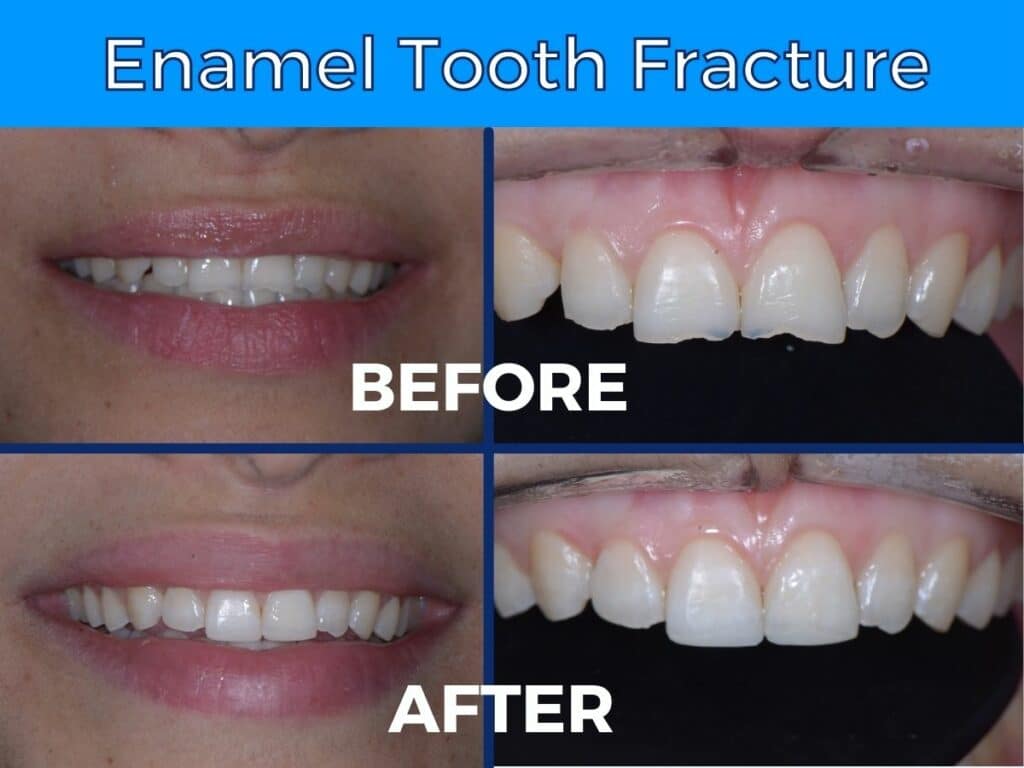
A tooth fracture that goes deeper than just the enamel is called a dentine fracture. This is where the fracturing of the enamel exposes the underlying dentine typically causing some pain.
Does A Dentine Tooth Fracture Hurt? Usually yes, the tooth becomes very sensitive to temperature. If the fracture is the result of trauma, the tooth may also be tender to biting or touching for 3-5 days.
How Can A Dentine Tooth Fracture Be Fixed? The tooth can be fixed by rebuilding the chipped section with tooth colored bonding making sure that the dentine is sealed once again.
What Causes Dentine Tooth Fracture? Similar to enamel fracture’s things like chewing ice, trauma, or biting into something hard can all cause this type of fracture especially if the teeth are weak from lack of proper oral hygiene.
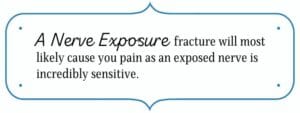 Nerve Exposure Fracture
Nerve Exposure FractureVery deep tooth fractures can not only expose the dentine layer of the tooth but can reach part of the nerve. This type of tooth fracture will most likely cause you pain as an exposed nerve is incredibly sensitive. This type of fracture needs to be dealt with quickly to save the tooth.
Do Nerve Exposure Tooth Fractures Hurt? Yes, the tooth is sensitive to temperature, breathing or spontaneously. If the fracture is the result of trauma, the tooth may also be tender to biting or touching for 3-5 days. Because the exposed nerve can be irritated by just breathing,the best thing you can do to try to reduce pain until you can get to a dentist is to breathe through your nose and keep your mouth closed as much as possible. A dental appointment will be needed to numb the tooth and treat it.
How Can A Nerve Exposure Fracture Be Fixed? Most of the time a root canal is needed, followed by rebuilding the tooth with a crown. However, in children and adolescents a front tooth fracture at this level can be treated without a root canal followed by yearly monitoring of the nerve condition.
What Causes Nerve Exposure Fractures? The same kinds of things that cause enamel or dentine fractures can cause nerve exposure fractures if they are done harder or if the tooth is weaker and more susceptible to trauma.
Most crown-level tooth fractures can be fixed but it is important to go see an experienced dentist near you if you’ve suffered a tooth fracture so that they can repair the damage before it gets worse or leads to further tooth decay.
Unfortunately root level tooth fractures, also referred to as cracked teeth, are usually not treatable and require the extraction of the tooth and replacement with a dental implant. These types of tooth fractures can occur from trauma, clenching, or biting into something hard such as an olive pit or chewing ice. Occasionally root fractures can occur under a crown that isn’t even damaged, usually because the roots have been weakened by a previous root canal treatment or a large post. If a root fracture occurs under the crown of the tooth the treatment is to extract the tooth and replace it with a dental implant or a dental bridge.

If you are dealing with a fractured tooth whether it be just a small chip of enamel or a large fracture with the nerve exposed it is always best to make an appointment with your local family dentist for them to check it out and treat it. Your teeth are designed the way they are to protect your gums and mouth from harmful bacteria. If you leave a chipped tooth untreated it can expose the tooth and make it vulnerable to cavities or even an abscess. If you live in the New York City area and are dealing with a chipped tooth don’t hesitate to reach out to our office here at Making You Smile Cosmetic Dental Studio NYC. We would be happy to answer any questions you may have or to book an appointment for you.
 Being pregnant is such a special time of life but it can come with its own challenges. When you are pregnant it’s important to continue to do what you can to maintain good oral health, especially if you are dealing with morning sickness. It’s important to make sure you brush your teeth after you are sick to help prevent stomach acids from negatively impacting your teeth and gums.
Being pregnant is such a special time of life but it can come with its own challenges. When you are pregnant it’s important to continue to do what you can to maintain good oral health, especially if you are dealing with morning sickness. It’s important to make sure you brush your teeth after you are sick to help prevent stomach acids from negatively impacting your teeth and gums.
Here are Making You Smile, your top-rated family dentist in NYC, we love getting a chance to check in with our pregnant patients. When they come in to visit they often ask a number of questions regarding pregnancy and dental work so we thought we’d take a moment to answer some of the most frequently asked questions about going to the dentist when you are pregnant.
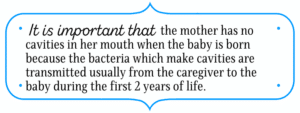 The simple answer is yes pregnant women can have dental work completed while they are pregnant. If the work is elective dental work (dental work not related to pain or an emergency) it is usually best performed during the second trimester. It is important that the mother has no cavities in her mouth when the baby is born because the bacteria which make cavities are transmitted usually from the caregiver to the baby during the first 2 years of life through saliva, such as when the baby food is tested for temperature by the caregiver, using a spoon and then the same spoon is used to feed the baby, or by kissing the baby on the mouth or hands and then the baby places his or her hands in their mouth. If that transmission is reduced because the caregiver is cavity-free, then the child will have a lower incidence of cavities throughout their life, even as an adult. So, it is important to get the oral disease of the mom treated before the baby is born and the second trimester is the safest time to do it.
The simple answer is yes pregnant women can have dental work completed while they are pregnant. If the work is elective dental work (dental work not related to pain or an emergency) it is usually best performed during the second trimester. It is important that the mother has no cavities in her mouth when the baby is born because the bacteria which make cavities are transmitted usually from the caregiver to the baby during the first 2 years of life through saliva, such as when the baby food is tested for temperature by the caregiver, using a spoon and then the same spoon is used to feed the baby, or by kissing the baby on the mouth or hands and then the baby places his or her hands in their mouth. If that transmission is reduced because the caregiver is cavity-free, then the child will have a lower incidence of cavities throughout their life, even as an adult. So, it is important to get the oral disease of the mom treated before the baby is born and the second trimester is the safest time to do it.
Here at Making You Smile NYC, we try to avoid x-rays during pregnancy. However, if there is an emergency and x-rays are needed to diagnose a problem, there is a very safe way to do it. Usually, we use one x-ray shield on all patients when we take x-rays, for pregnant mothers we use a double shield over the entire chest and belly. This extra precaution coupled with the very low radiation level used on digital x-rays makes sure the baby is protected from any x-rays.
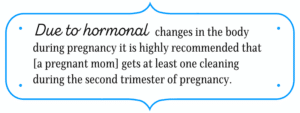 Yes, dental cleanings are safe and recommended during pregnancy. The hormonal changes in the body during pregnancy can make the gums more prone to inflammation and bleeding. It is important for the mom to keep the health of her teeth and gums. Therefore, it is highly recommended that she gets at least one cleaning during the second trimester of pregnancy.
Yes, dental cleanings are safe and recommended during pregnancy. The hormonal changes in the body during pregnancy can make the gums more prone to inflammation and bleeding. It is important for the mom to keep the health of her teeth and gums. Therefore, it is highly recommended that she gets at least one cleaning during the second trimester of pregnancy.
If needed, then yes a pregnant mother can have a dental injection (local anesthetic) to be able to get dental work done. Many dental anesthetics are safe during pregnancy; however, obstetricians usually recommend the ones which do not contain epinephrine such as Mepivacaine. If you need dental work done while pregnant that involves getting an injection an experienced dentist near you will go over your options of anesthetics. Breastfeeding mothers can also have dental injections as needed for any dental work they require. It is recommended that they save some milk ahead of time for one or two feedings and discard milk for the following four hours after the appointment.

If you live in New York City and are looking for a new family dentist and you are pregnant don’t hesitate to contact our office about setting up an initial consultation. We would be happy to meet with you and answer any questions you might have about our dental clinic or about pregnancy and dental care. Contact us today.


Bruxism, also known as grinding one’s teeth, is the action of gnashing or rubbing of the upper and lower teeth together usually during the nighttime, although some people will grind their teeth throughout the day as well.
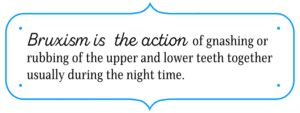 Bruxism is typically an unconscious or uncontrolled action that the person isn’t even aware they are doing. Mild grinding of your teeth can be annoying but not require treatment; however severe bruxism can eventually lead to jaw disorders, headaches, and damaged teeth as it can put up to 250 pounds of force on a person’s teeth and jaws.
Bruxism is typically an unconscious or uncontrolled action that the person isn’t even aware they are doing. Mild grinding of your teeth can be annoying but not require treatment; however severe bruxism can eventually lead to jaw disorders, headaches, and damaged teeth as it can put up to 250 pounds of force on a person’s teeth and jaws.
If you find you are waking up in the morning with a sore jaw or headache you should speak with an experienced dentist near you for possible bruxism treatment options.
Where grinding or bruxism is the rubbing together of your teeth throughout the night, clenching is the tightening of the jaw muscles without actually moving one’s jaws. Both actions can lead to discomfort or pain in the jaw muscles, but only bruxism will also damage the teeth.
Sleep teeth grinding is more common in children and adolescents, where it is estimated up to 50% of children grind their teeth while they sleep. This number drops to 15% when children hit adolescents and 3% in adulthood.
It is not fully known why some people grind or clench their teeth. For children it is thought that it has to do with their growth and development and related to their teeth coming in. Bruxism in adults however, is thought to be a condition related to stress, anxiety or other pathophysiological causes.
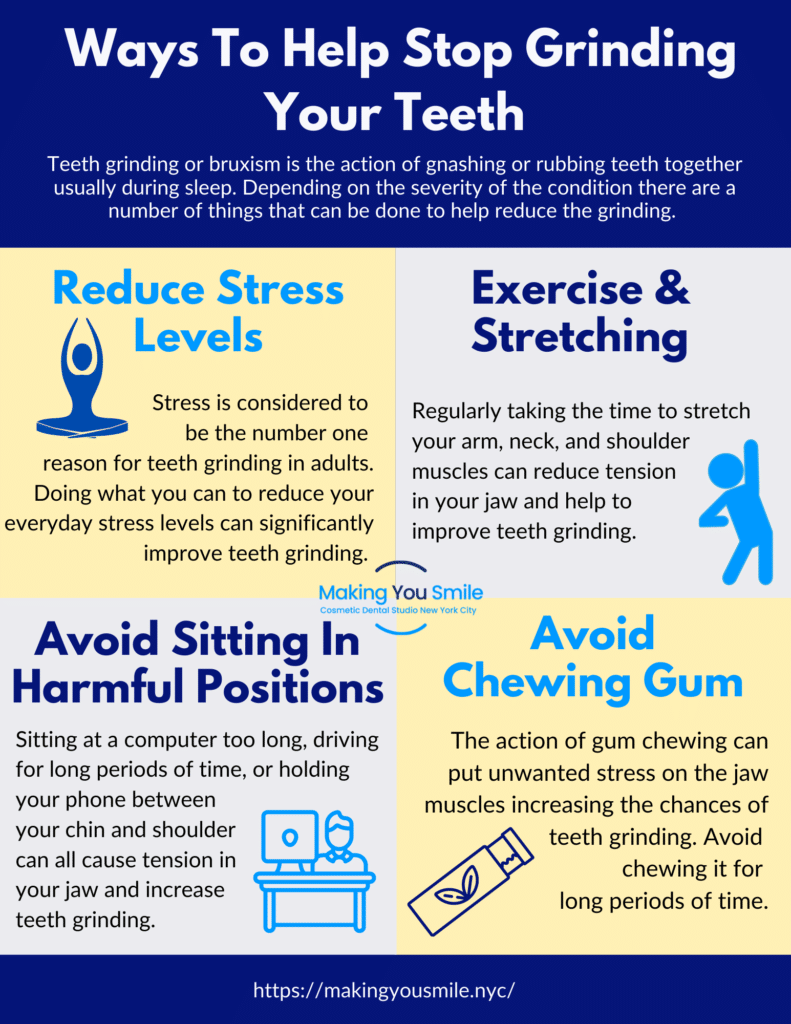 What Can I Do To Stop Grinding My Teeth?
What Can I Do To Stop Grinding My Teeth?Depending on the severity of the condition there are a number of things you can try to help reduce your teeth grinding.
If the grinding or clenching of your teeth is not associated with pain on chewing localized in front of the ear (TMD: temporo-mandibular disorder: a problem in the jaw articulation) there are many options to alleviate teeth grinding including:
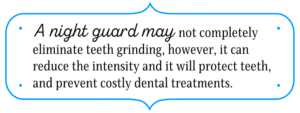 If the teeth grinding is creating noise during sleep (as reported by a family member or friend) or causing chipped/flattened/broken teeth as diagnosed by a local dentist near you then a nightguard may be helpful to prevent future harmful effects to your teeth. A night guard may not completely eliminate the teeth grinding, however, it can reduce the intensity and it will protect the teeth and prevent costly dental treatments.
If the teeth grinding is creating noise during sleep (as reported by a family member or friend) or causing chipped/flattened/broken teeth as diagnosed by a local dentist near you then a nightguard may be helpful to prevent future harmful effects to your teeth. A night guard may not completely eliminate the teeth grinding, however, it can reduce the intensity and it will protect the teeth and prevent costly dental treatments.
If the teeth grinding/clenching is associated with TMD and you are suffering from other symptoms such as headaches, migraines, shoulder or neck pain, then an evaluation by a TMJ specialist would be most beneficial to diagnose and treat the TMD together with the other symptoms comprehensively.
Many of the above suggestions for dealing with teeth grinding can still be implemented for more severe cases combined with more specialized occlusal splints finely adjusted to treat any potential articulation issues.

If you are concerned about bruxism and grinding your teeth and you live in Manhattan or anywhere in New York don’t hesitate to contact the office at Making You Smile Cosmetic Dental Studio for a treatment consultation today.